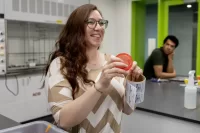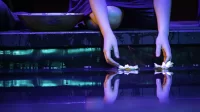
Leigh Weisenburger, the head of the Bates Admission operation, kicked off a recent workday at Lindholm House by talking via Zoom with prospective students in China — 8 a.m. Bates time, 8 p.m. Beijing time.
Then she joined a few Zoom meetings — planning for the new year — before heading downstairs to refresh her coffee.
There, she saw a prospective student and parents coming up the walk, so she paused to hold the door and greet the visitors, learning they’d driven up that morning from the Boston area for an in-person campus tour.
Welcome to Bates Admission, still headquartered in historic Lindholm House on Campus Avenue but reimagined by the pandemic.
“It all feels really cool and really smart — and long overdue.”
Long defined by an in-person approach that emphasized campus visits and interviews and massive amounts of staff travel to schools and community organizations across the globe, the program has become more a la carte, with a mix of offerings — in person and virtual, live and on demand.
And it works. Weisenburger and her team, she says, have been able to do a more efficient and more equitable job of reaching prospective students around the world.
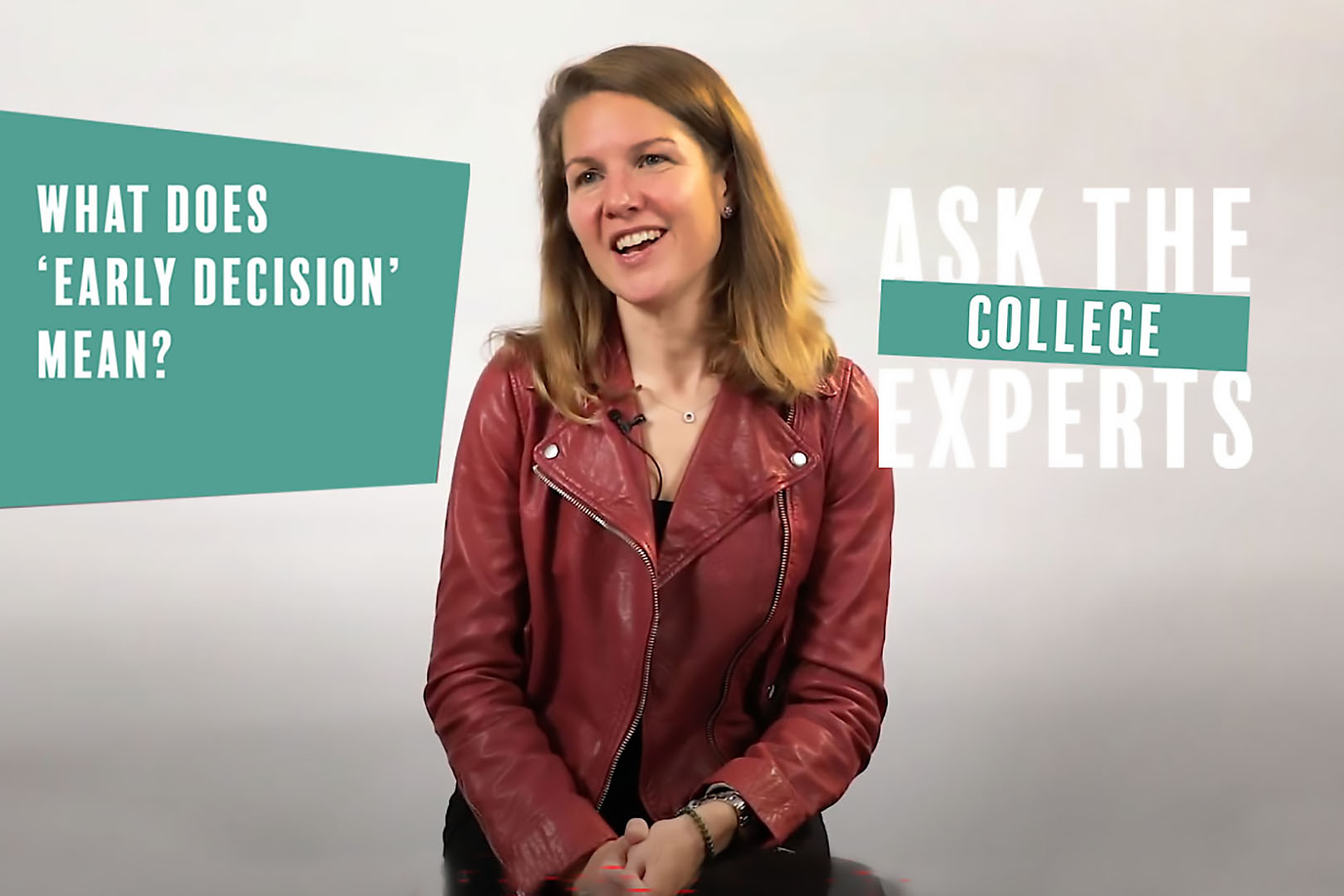
Last year, as the pandemic pushed the Bates enrollment operation into a virtual space, Weisenburger and her team initially felt a sense of calamity. “It was so disorienting. All we thought was, ‘How are we going to do this?’”
Now, with the Class of 2025 on the college’s doorstep, Weisenburger is proud of her team’s achievement: recruiting and enrolling a new class while working from home offices (Bates staff have mostly been remote since March 2020) while staying true to the college’s “holistic” approach to admission.
“It all feels really cool and really smart — and long overdue,” says Weisenburger.
We talked with Weisenburger, Bates’ vice president for enrollment and dean of admission and financial aid, about the experience and lessons from recruiting a new Bates class using online strategies and tactics.
The Class of 2025 has experienced COVID since the spring of their junior year in high school. How did that experience play out in their applications?
This year, the Common Application and within the Coalition Application, which we use as well, had a new designated COVID response. So in addition to what is the traditional college essay, there was now this additional, optional space for students to share their COVID experience.
We didn’t know how many students would answer the question and to what end. Would they explain extremely dire family circumstances tied to COVID illness? Or would we hear the other end of the spectrum: “I was bummed because my prom was canceled.” Well, we saw both extremes and a lot in between.
In their essays, some students were very direct in articulating how COVID has impacted their lives. With other students, we discovered the impact more indirectly.
In the transcript?
Yes, and in a shift in the pattern of their activities.
We heard from counselors and teachers explaining changes in grading systems — for example, schools going from traditional grades to pass/fail to help their students out. For us, it was a matter of putting puzzle pieces together when reviewing all the parts of an application. By and large, we were getting those pieces of how COVID transformed their life in other parts of the application.
How did you evaluate changes in activities due to the pandemic?
It might be idealistic, but I think COVID, at least for a while, was a great equalizer because regardless of a family’s means, everyone was in the same boat: nobody could do anything.
You couldn’t go to lacrosse. You couldn’t go to violin lessons. You couldn’t go to your hamburger-joint job.
But isn’t that just a setback for everyone?
No, because it was refreshing to read applications where you could literally feel a student’s life slowing down to a less frenetic pace.
We used to spend so much time during information sessions explaining to students that they need to find and express their authentic voice and selves in their applications. We would try to suggest they carve out an hour of their day, “to stop and think and be with yourself.” But they would say, “Well, how do I find my authentic self when I’m scheduled all day and night.”
For at least a few months during the pandemic, students were actually forced to sit and just be. In their applications, we saw them using this time to discover new passions or rediscovering old passions. That was refreshing.
I hope these students bring with them the ability to slow down. I hope they don’t immediately, when they arrive at Bates, revert back to being scheduled from 6:30 a.m. to whenever.
Bates uses a holistic approach to admission, loosely defined as viewing applicants as more than just the sum of test scores, grades, activities, etc. Did this approach help you introduce the pandemic as an “x factor” in an application?
For certain. I have every confidence in the team that they care deeply about the applicants, respect the applicants, and want to do right by the applicants.
While we always love reading applications and the ways students invite us in and share their stories, this year more than ever, there was a lot of human curiosity, I think. We hadn’t visited these students on their turf in ways we had in the past, and we hadn’t met these students on our turf when they were coming to campus. So this year, there was a sense of the moment, “Oh my gosh, I’m finally meeting this person!”
With regards to holistic admission and our review process, I’ve said for years that we’re accustomed to reading different transcripts and we’re accustomed to reading different grading systems. We’re accustomed to students coming to us from a variety of learning environments that may have shifted over the course of their high school career.
So having to accommodate the X factor of the pandemic didn’t feel like a huge wrench thrown into things for us. More specifically, we know how to do test-optional admission, where thousands of peers were doing that for the first time ever. It’s just old hat for us.
We were just really comfortable with the unknowns and comfortable with putting the puzzle pieces together.
What about the time-honored tradition of the one-on-one, in person interview?
Even prior to the pandemic, we were wrestling with the idea of moving away from evaluative interviews and offering optional and informational interviews only.
Why the change?
A generation ago, we emphasized the importance of the interview. There was a line in the Viewbook: “Candidates without an interview may be placing themselves at a disadvantage in the evaluation process.”
But we know now that interviews can be fraught. We know so much more about implicit bias now — there’s just so much opportunity for bias to arise in an interview setting, whether it’s interviewing for a job or interviewing for college.
And then we also ask ourselves a question through an equity lens. “Who has the privilege to know these interviews exist? Who has access to them?” It’s just problematic layer on layer on layer. And, at least historically, we know that interviews have been more of a recruitment tool than an effective assessment tool.
So we were already positioned to make a move to strictly informational interviews. With the pandemic, it was perfect timing.
Can you talk to me about what the mix of Admission programming looks like now compared to pre-pandemic?
In summer and fall 2019, we did in-person travel to 39 U.S. states and five continents. We participated in 896 in-person events — visits to schools, college fairs, panels, and community based organizations.
Last fall and winter, during the pandemic with no travel, we still were able to virtually visit 44 states and 532 schools while vastly expanding how students can learn about Bates without having to visit in person.
Along with our popular online campus tour, we deployed a second series of “Ask the Experts” YouTube videos, and continued our “Bobcat Chats,” ask-me-anything gatherings on Zoom where Bates people talk about various topics, from academics and financial aid to sustainability and the Lewiston-Auburn community.
During the yield season in the spring, when students make their final choice among colleges they’ve been admitted to, we used to host huge Admitted Student Receptions on campus and also events around the country.
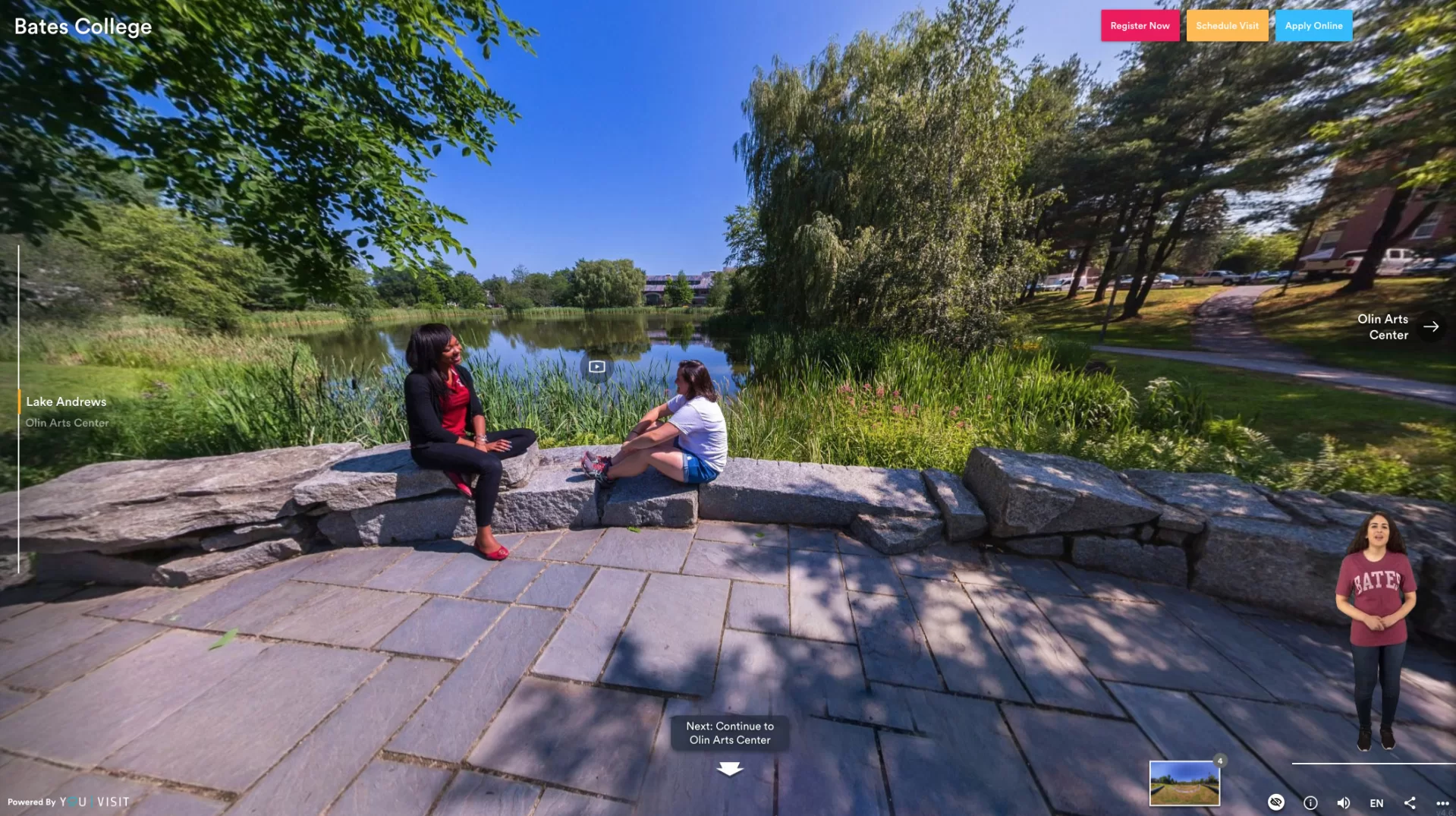
This year, as with last, we put Bates community members front and center in our virtual events. Current students designed and managed a series of other events. We deployed “The Den,” a portal to help 2025 admitted students connect with one another and Bates community members.
Without the disruption of the pandemic, I don’t see how we could have developed such a great mix of virtual and in-person offerings. But that’s the point of disruption, right?
What’s your stance on how we’re all able to reveal something about our personal lives through our Zoom screens?
At the start of the pandemic, it was, “Get your background up! Have your name and title! Have the Bobcat logo in the corner! And now it’s just like, “Here’s my laundry room.”
I like the realness and the sense that we’re in this together and it’s about us having a conversation. Whatever the communication is, people respond to authenticity.
Will we return to the pre-pandemic routine of families doing massive college-visit trips in the summer?
There’s no reason we need to.
Of course, in-person experiences will always be part of what we do. We are a residential college. But from the perspective of a prospective student, you can get such a better taste of Bates life, and be so much more efficient with your college search, by accessing our live and on-demand digital content, such as the Bobcat Chat series.
I used to half-joke with families who were preparing that big trip, telling them that “OK, if you visit X College, and your child absolutely hates it after the first 15 minutes, are you willing to drive away rather than spending the time you expected? Or if your child absolutely loves Bates and wants to stay for way longer than your allotted two hours, maybe attend an a cappella concert and sit in the library, are you prepared to let them?”
The point being, that big college swing through the Northeast rarely allows for any flexibility. Now, you can make that first “pass” through Bates virtually. And I think it’s hugely beneficial.
What are the implications of being able to recruit a class without leaving home?
I read an article recently by a high school counselor suggesting that we’re seeing a throwback to how students applied to college long ago, where there wasn’t an expectation of visiting so many colleges before you applied. You applied to your colleges, then maybe visited the ones you are admitted to.
For a long time now, families have felt that they have to visit all the colleges that their student applies to. And colleges have fed into that belief by emphasizing the campus visit and the campus interview as important markers of an applicant’s interest in our schools.
At the same time, many students were applying, being admitted, and coming to Bates without ever visiting campus. So now, I’m pushing our team to help keep that temperature down a degree or two or three, and keep letting families know that an in-person visit is not a necessary part of learning about Bates.
Do you also view the rise of online/in-demand offerings through an equity lens, realizing that, in the past, learning about Bates was far easier for families who could get here and how relatively hard it was for families who could not get here for whatever reason?
Absolutely. I think about the team’s energy and resources that we can now bring to the table. Don’t get me wrong: There’s a certain level of energy when you can have an in-person experience.
But I think about the presentation for Chinese students that I did with a colleague from Syracuse University this morning.
Neither of us was jet-lagged. Neither of us were stressed about trying to leave our hotel and find the school. She was in her office and had her coffee cup, and I was in my office and I had my window open just the way I like it. And I could feel almost as much energy through that session as you would in person.
I think of how many times I’ve arrived at school for a visit that, unbeknownst to me, was scheduled against a prep session for the AP chemistry exam, and the teacher understandably put the kibosh on any of their students leaving. So you leave a little Bates booklet with your name and hope they follow up.
Whereas the session we did this morning, and many others like it that we do, was recorded and made available for students to consume at their leisure.
Bates issued a lot of pandemic-response communications last year. Did Bates’ conduct last year play well among prospective students and families?
I think it was absolutely a positive for families, no question, in terms of thinking, “Can I send my child there? Will it be safe? Will they be healthy? Can I trust this place?” That absolutely helped us. It would come up in either the family Facebook group or in correspondence or other AMAs that we would do.
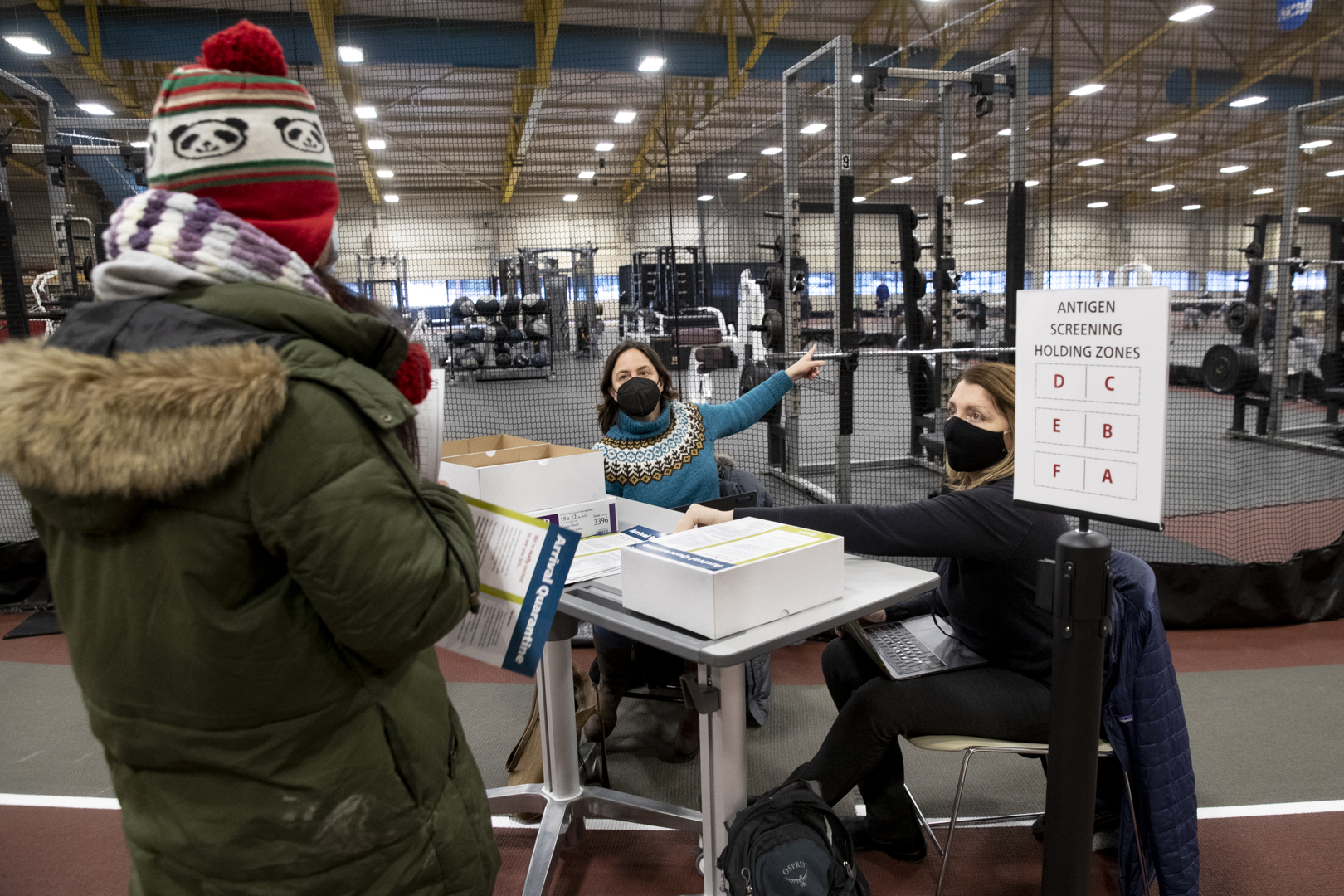
Among students, it was a little tougher to discern. It’s something we’ve talked about as a team. Whether or not we want to admit it, in some ways this reality is all they know about high school and college right now. In their 17 years, pandemic routines have taken up more than a year. So they’re kind of like, “Yeah, I’ll wear a mask. Yeah, I’ll wash my hands. Yeah, I’ll hang with the same group of 10 people just to make sure we’re safe.”
But I’m sure they appreciated the realness of our communications, how you can present pandemic response policy in an Instagram Story rather than some staid announcement. It certainly shed light on what it’s like to be a student and how you can expect to be communicated with.
Do you sense any trends about students’ willingness to go far away to college?
This is the most geographically diverse class in the history of Bates College, with 65 percent from outside New England.
Continuing to expand and diversify our application pool is important to Bates as an institution, as we must take advantage of demographic trends, as the U.S. population shifts to the South and West.
After talking with colleagues from other institutions, I think that students who enrolled last fall may have had a desire to stay closer to home and keep their concentric circles tight. Now, we might be seeing a sense of “I’ve gotta get out of Dodge. I’ve been limited in my ability where to go And now I have to go.”
What will be your message when you help welcome students and families at Orientation?
It will be a little bit of what I said earlier, how I hope they bring some of that slow-down to their daily lives at Bates, and don’t feel like they’re at the races and have to come flying out of the gates their first day.
Given the huge shifts in their lives since 2020, I think they are well-equipped to navigate what might come along during their time at Bates.
I think we also really need to celebrate them and say, there is literally no other class that’s entered Bates in the way they have. They’re coming to Bates with a powerful and unique perspective. They have a ton to learn, yes, but a ton of opportunity to shape Bates.
So many Bates traditions have been on hold in part because of the pandemic. What is going to be their legacy? How can they think about new ways of welcoming future classes to Bates? Or new traditions that might take hold, given the unique perspective and sort of vantage point that they’re kicking off their college career with.
It will be fascinating. Because it continues to be so different.


